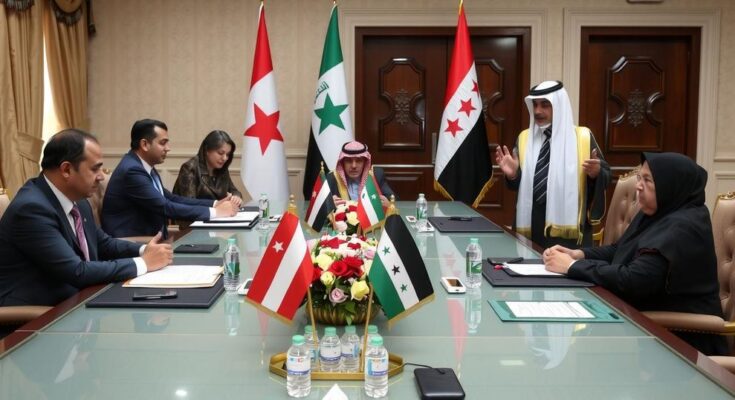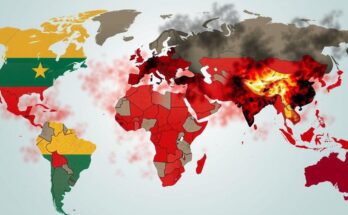During their first official meeting since the civil war, the UAE and Syria discussed ways to strengthen bilateral ties in light of Syria’s new interim government. UAE Foreign Minister Sheikh Abdullah reaffirmed support for Syria’s sovereignty while recognizing concerns regarding the new leadership’s Islamist affiliations. The meeting included other Syrian officials, indicating a broader effort to re-engage with the region after years of conflict and diplomatic isolation.
On Monday, foreign ministers from the United Arab Emirates (UAE) and Syria convened to discuss the enhancement of bilateral relations during Syria’s inaugural official visit to the UAE since the ousting of President Bashar al-Assad. UAE Foreign Minister Sheikh Abdullah bin Zayed Al Nahyan engaged with Syria’s new Foreign Minister Asaad al-Shaibani, emphasizing the need to strengthen the fraternal bonds between the two nations. This meeting, reported by UAE’s official WAM news agency, marks a significant step in reaffirming diplomatic connections previously strained by the Syrian civil war.
The UAE had actively promoted the restoration of ties with Assad prior to his regime’s downfall, which ultimately facilitated Syria’s reintegration into the Arab League in 2023. Sheikh Abdullah reiterated the UAE’s steadfast support for Syria’s sovereignty and independence. The meetings in Abu Dhabi also engaged Syrian Defence Minister Murhaf Abu Qasra and intelligence chief Anas Khattab, indicating a broad diplomatic endeavor to rebuild ties. Their UAE visit follows meetings with representatives from Qatar and Saudi Arabia, marking a strategic re-engagement in the region.
In December, following a decade of civil conflict, an interim government emerged in Syria, succeeding the domnance of Assad, whose administration saw significant territorial losses. Despite the dialogue between the UAE and Syria, analysts note a prevailing skepticism from the UAE towards Syria’s new leadership, driven by concerns over political Islam and growing Turkish influence within Syria. Notably, both Qatar and Turkey have reopened their embassies in Damascus, reaffirming diplomatic relations in light of recent developments.
UAE presidential adviser Anwar Gargash articulated last month the UAE’s apprehension regarding the Islamist affiliations of Syria’s interim rulers. He expressed that this association presents challenges to their overarching regional strategy, showcasing the complexities of rebuilding trust in a geopolitically sensitive environment.
The UAE has historically been active in Middle Eastern diplomacy, significantly influencing regional dynamics through its foreign policy initiatives. The civil war in Syria, which led to the displacement of many Syrians and caused widespread destruction, brought about a significant shift in alliances within the region. The UAE’s support for the reinstatement of President Bashar al-Assad was part of broader efforts to stabilize the region and counter the rise of political Islam and Turkish influence, which they perceive as potential threats to their own political stability. As the situation evolves, establishing constructive relations becomes pivotal for Syria’s recovery and regional integration.
The recent meeting between UAE and Syrian diplomats underscores a crucial step in the restoration of ties following the tumultuous period during the Syrian civil war. Despite the optimism expressed by Syrian officials for building constructive relations, underlying mistrust remains, particularly from the UAE’s perspective regarding Syria’s new leadership. The diplomatic engagements observed in the Gulf reflect a broader strategy to navigate the complexities of Middle Eastern geopolitics, as stakeholders seek to establish stability and foster cooperation amid longstanding conflicts.
Original Source: www.newarab.com




